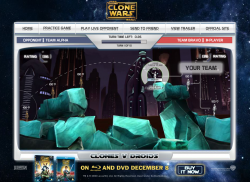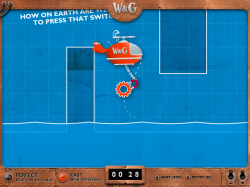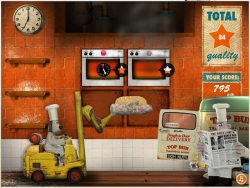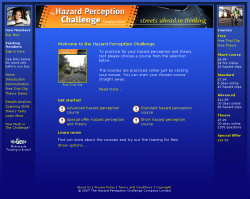 You have just 30 seconds to anticipate your opponent’s thoughts, give your troops orders and move them into position in this multiplayer ballistic fighting game. Then everyone opens fire, and another turn starts.
You have just 30 seconds to anticipate your opponent’s thoughts, give your troops orders and move them into position in this multiplayer ballistic fighting game. Then everyone opens fire, and another turn starts.
UPDATE! On playing this recently it seems to have been updated by someone, and broken in the process. The game now crashes often when you’re walking around, which never used to happen. What a shame.
Postmortem:
I could hardly believe it! Not only were we doing a game for the giant Star Wars Clone Wars franchise, but we’d pursuaded them to try something risky and unusual too! A custom-made ultra-light PHP back end would join random players together in an almost anonymous way over the internet so that they could battle each other rather than some shonky AI.
Not only that, but it worked too! In a little over a week, I’d built the game engine and back end and proven the concept. Then the public was unleashed on it. The server coped admirably with the strain of thousands of people playing it over and over. Success!
It could have been better, of course. Just about all things can be improved. In this game, I’d have liked to have spent a little longer getting a few of the interface details working smoother. It’s fiddly to set up shots, which is an area that could do with as little interface-friction as possible. That aside though, I’d really like to have improved the multiplayer features.
I designed the game to put a game together for every two visitors to the site. You get paired off with the next random that comes along, and you’re playing. Minimum fuss, minimum barrier to entry. My experience with lots of multiplayer games is that you get to a daunting room full of 11yo kids who are just waiting for a newbie to kick about the place. I specifically designed against that effect here by removing the ability to pick your opponent, or play them again, or even to know who they are. All you get is a rank – a single number to hint at whether they’ve played before, and whether they were any good or not.
This really works – people dive in and play in generally fair games, which is great. It also means we never have to store user accounts on the server, which is also great. Each player keeps their rank in their shared-object, and it is exchanged at the start of the game. At the end of the game, each player calculates their new rank based on the Elo chess ranking system, and stores it away for next time. Yeah, you could fiddle the number and cheat, but really, who cares? There’s no leaderboard, and no way to shout out how great you are, so there’s very little incentive to cheat. That’s the best cheat-protection system I’ve ever come across!
The downside is that whilst it’s addictive for a while, it won’t hold people for a great length of time. After a while you get bored of there being no further progression. Of not being able to chat with your opponent and of not being able to have a rematch if it was a great game. These features I’d add in another similar game.
I’d give the players a chat box, that they could use at any point especially including whilst waiting for the server to sync up and exchange the moves. I’d also add a ‘play this person again’ checkbox that appears mid-game, so if you both clicked it and left it selected, it’d arrange your next match against each other. I’d also consider an optional match-up room of some sort, so you could meet up with friends. I’d definitely let you enter a name for yourself and exchange that with the other player, so you had some idea who you were playing. Maybe allow a pictorial avatar too. And some sort of earned rankings beyond a simple number. Maybe a veteran’s medal after 10 games, a high-roller medal after they hit a rank of 1600 and so on. You could even allow different things in-game based on what they had earned. Maybe veterans get the ability to pick their fights more carefully. Perhaps high ranked people get access to new weapons when playing against other high ranked people. Giving the player some sort of progression, something to work towards, would go a long way.
Lessons:
- Multiplayer immediately adds depth to almost any game
- People love playing against people, even if they’re unidentified randoms
- Provide a way for people to communicate in-game
- Provide a way for people to arrange battles with people they know, if they want
- Provide a way for people to give themselves an identity of sorts in your game
- Provide some sort of progression for the player to work towards, over multiple games
- Removing incentives to cheat is far more effective than building technological safeguards against cheating
 A spiritual sucessor to Hanna in a Choppa, Wallace and Gromit: Invention Suspension sees you helping Gromit to pilot a remote-control chopper to collect parts for their new invention.
A spiritual sucessor to Hanna in a Choppa, Wallace and Gromit: Invention Suspension sees you helping Gromit to pilot a remote-control chopper to collect parts for their new invention. The Fit4Anything website supplies mental health assessments for urban youngsters at risk of taking the wrong path.
The Fit4Anything website supplies mental health assessments for urban youngsters at risk of taking the wrong path.

 This CMS driven website was designed and built for the owner of a beauty-therapy company. There wasn’t much content last time I checked, but the site design is worth a quick look nonetheless.
This CMS driven website was designed and built for the owner of a beauty-therapy company. There wasn’t much content last time I checked, but the site design is worth a quick look nonetheless.
 If the idea of playing a game on an Always sanitary towel disgusts you, just imagine how I felt developing this one!
If the idea of playing a game on an Always sanitary towel disgusts you, just imagine how I felt developing this one! You have just 30 seconds to anticipate your opponent’s thoughts, give your troops orders and move them into position in this multiplayer ballistic fighting game. Then everyone opens fire, and another turn starts.
You have just 30 seconds to anticipate your opponent’s thoughts, give your troops orders and move them into position in this multiplayer ballistic fighting game. Then everyone opens fire, and another turn starts. The Selenia site was created for University West of England to give teachers and pupils a fun science learning resource. There are lots of beautifully drawn comics available (created by a third party), along with supporting minigames and other stuff.
The Selenia site was created for University West of England to give teachers and pupils a fun science learning resource. There are lots of beautifully drawn comics available (created by a third party), along with supporting minigames and other stuff.
 RSS 2.0 full site
RSS 2.0 full site